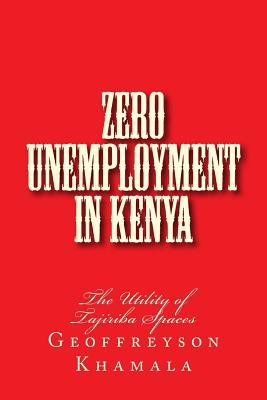| Zero Unemployment in Kenya: The Utility of Tajiriba Spaces Contributor(s): Khamala, Geoffreyson (Author) |
|
 |
ISBN: 1508684642 ISBN-13: 9781508684640 Publisher: Createspace Independent Publishing Platform OUR PRICE: $7.60 Product Type: Paperback Published: March 2015 |
| Additional Information |
| BISAC Categories: - Political Science | Public Policy - General |
| Physical Information: 0.33" H x 5.98" W x 9.02" (0.47 lbs) 152 pages |
| Descriptions, Reviews, Etc. |
| Publisher Description: Practically half of Kenyans, about 21.5 million people, are poor. Ensuring citizens have an income is the single most effective means of transforming lives and reducing deep-rooted poverty and inequality. Regrettably, lack of income opportunities has become such a huge challenge in Kenya. Many Kenyans leave school hoping to find work or start a viable business to participate in economic building, but for the last three decades income opportunities have not been forthcoming. Statistics on joblessness and inactivity indicate that over 40 per cent Kenyans are without stable incomes. The joblessness and idleness crisis in Kenya, however, is just a symptom of something worse - relatedness. Relatedness is the most significant constraint on the capacity of the Kenyan economy to grow and to create enough opportunities to accommodate the ever-increasing number of school-leavers (and school drop-outs). Just about 10 million Kenyans of the working age are not gainfully engaged. The country needs to deliver at least 1,000,000 job opportunities every year for several years to serve the increasing number of jobless college graduates. Despite this, Kenya only manages to produce insignificant (116,000) new income opportunities annually. In the face of the skyrocketing public wage bill, it is clear that employment expansion in the public sector is not a realistic alternative. Impliedly therefore, Kenya's struggle with unemployment can only be meaningfully resolved through the expansion of the private sector. Whereas the public sector was devolved with the promulgation of the 2010 constitution, the private sector is yet to decentralize. As such, remote rural locations and urban slums possess unexploited potential. Tajiriba Spaces are platforms of change, mechanisms for employment creation, opportunities for revenue creation and avenues for academic engagement and dialogue on policy matters in remote rural environments and informal settlements in urban centers. Remote rural locations and urban slums are the next growth frontier. The strategy is to steadily transform neglected and disadvantaged geographical locations into future megacities. By urbanizing neighborhoods through Tajiriba Spaces, it is possible to spur the Kenyan economy to create millions of new income opportunities, and to achieve zero unemployment. |